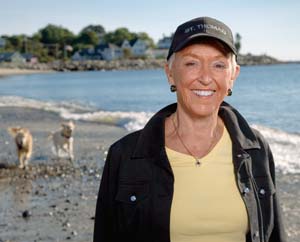 |
 |
| current issue |  | past issues |  | send a letter/news |  | address update |  | advertise |  | about us |  | alumni home |
Features
|
Preserving the Good Life
When a pond where Jo Lamprey used to harvest ice as a child rarely freezes over anymore, she knows something needs to be done. |
Easy to print version |
 Bruce Cramer |
Jo Lamprey witnesses subtle changes in climate from her patio. Through the years, she has seen the winds blow more fiercely, the rains fall more heavily. Last year's eerie October snowstorm downed trees and left communities throughout the region without power for days. The high tide mark more often than not exceeds its usual measure, causing beach erosion that threatens waterfront homes in nearby Plaice Cove. The shifts she's seeing on New Hampshire's tiny coastline are hints, she suspects, of how climate change is affecting the planet.
Lamprey has been keeping an eye on the New Hampshire weather ever since she was a child growing up on her family's farm in coastal North Hampton. Back then, before it was a pressing concern—and a popular buzzword—living a sustainable life was simply "living the good life." Her family raised chickens and dairy cattle, drove Belgian draft horses during the summer hay harvest, canned vegetables, cut firewood and harvested ice on a nearby pond. The weather was an integral part of the daily routine, a steady rhythm of sunshine and rain, planting and harvest.
It was Lamprey's grandfather and great-uncle, Austin and Warren, who started the family business during the late 19th century—a business closely tied to the changing of the seasons. Lamprey Brothers provided hard coal, coke (a kind of porous coal), wood and ice to families in the Seacoast area and southern Maine. In 1934, Lamprey's father, Morris, added heating oil to the list. Ever since, Lamprey Brothers has been delivering oil, servicing and installing heating and cooling systems, and keeping customers comfortable through the year—rain or shine, heat wave or deep freeze.
By 2000, when Lamprey joined her brothers in the family business after a successful career in health consulting, the facts she was hearing were sobering: an estimated 40 percent of the country's greenhouse gas, one of the primary culprits in the climate change crisis, was coming from the residential sector. "I didn't stop to consider that things would change so much," she says. "But they have." Lamprey saw the situation as an opportunity—and a challenge. "I've had climate scientists say to me, 'Jo, you run an oil company. How can you grow the business without feeding the problem?'" Her answer was simple: "It's about bringing in more customers to burn less oil."
Lamprey Brothers was so successful in promoting greater efficiency that, in 2008, the company was the first in New England to be named an Energy Star Retail Partner. By educating customers about efficient heating and cooling systems, Lamprey Brothers helps reduce fossil fuel consumption, lower energy bills—and soften the impact on the environment. "The environment has become one of our stakeholders in the company," says Lamprey.
Easy to print version
blog comments powered by Disqus

